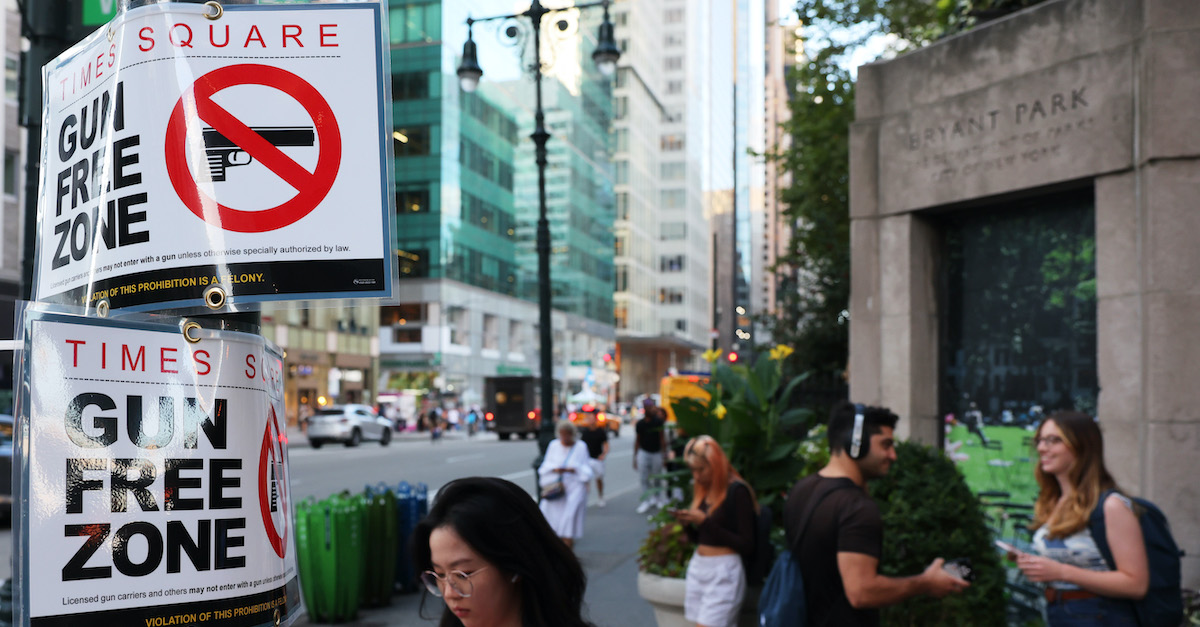
A “Gun Free Zone” sign posted on 41st Street and 6th Avenue on Aug. 31, 2022 in New York City.
A three-judge panel of a federal appeals court in New York ruled on Monday that the Empire State’s hotly contested gun law will remain in place as legal challenges to the regulations make their way through the courts. The order is the third stay issued this month by the U.S. Court of Appeals for the Second Circuit that relates to the controversial firearms law.
Last June, the U.S. Supreme Court struck down New York’s century-old handgun licensing regime as unconstitutional. Writing for the six-member majority, Justice Clarence Thomas determined that the state’s “special need for self-defense” requirement to carry in public was an unconstitutional violation of the Second Amendment. To pass constitutional muster, licensing requirements must be “consistent with this Nation’s historical tradition of firearm regulation,” the high court noted.
Following the landmark SCOTUS ruling, New York Gov. Kathy Hochul (D) ordered the state’s Democratic-majority legislature into an emergency session. New York then enacted a new concealed carry law which made it a felony to possess a gun in “sensitive areas” (such as museums, stadiums, public transit systems, parks, Times Square and houses of worship), as well as “restricted areas” (such as private property). In addition to the location restrictions, the law adds training requirements for concealed-carry permits, as well as the requirement that applicants submit to a written exam, an in-person screening, and a review of social media accounts.
Immediately, that statute faced multiple legal challenges.
One such challenge was filed by activist groups and gun owners in Buffalo who argued that New York’s restrictive provisions constitute a ban on arms “virtually everywhere.”
U.S. District Judge John L. Sinatra (a Donald Trump appointee) previously found in favor of the plaintiffs on the same basis that Justice Thomas ruled against the original New York law: that the restrictions were “inconsistent with the nation’s historical traditions.” New York appealed via its Attorney General Letitia James (D).
A three-judge panel of the Second Circuit made up of U.S. Circuit Judges Robert D. Sack (a Bill Clinton appointee), Richard C. Wesley (a George W. Bush appointee), and Joseph F. Bianco (a Donald Trump appointee) ruled unanimously to stay Sinatra’s order pending the outcome of New York’s appeal. The court’s one-page order simply said that “a stay pending appeal is warranted” while citing to the applicable factors referenced in the case, In re World Trade Ctr. Disaster Site Litig., 503 F.3d 167, 170 (2d Cir. 2007).
Those factors were:
“(1) whether the stay applicant has made a strong showing that he is likely to succeed on the merits;[] (2) whether the applicant will be irreparably injured absent a stay; (3) whether issuance of the stay will substantially injure the other parties interested in the proceeding; and (4) where the public interest lies.”
The Second Circuit did not elaborate on its reasoning in the case at hand, Christian v. Nigrelli.
Counsel for the parties did not immediately respond to request for comment.
[Photo by Michael M. Santiago/Getty Images]
Have a tip we should know? [email protected]